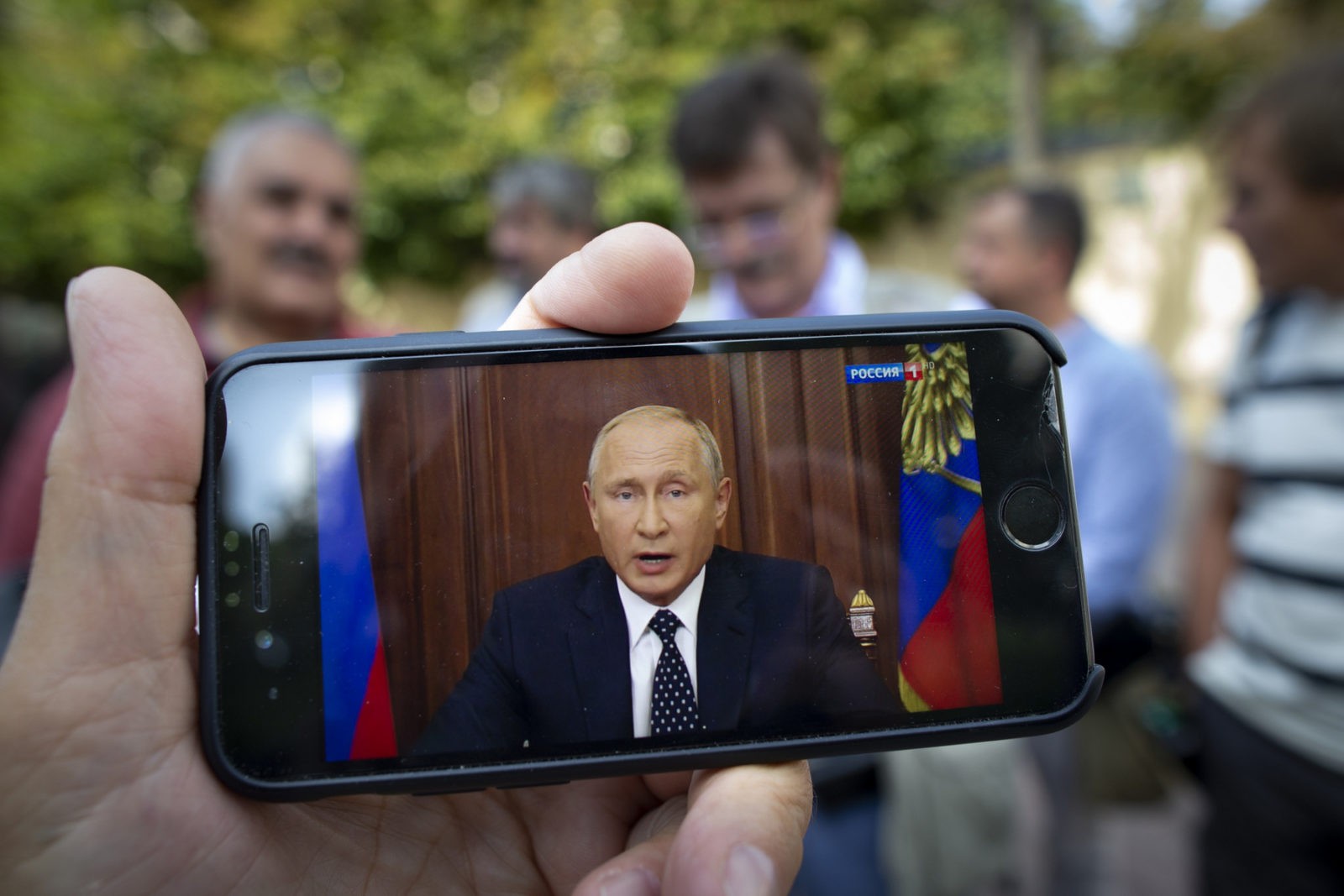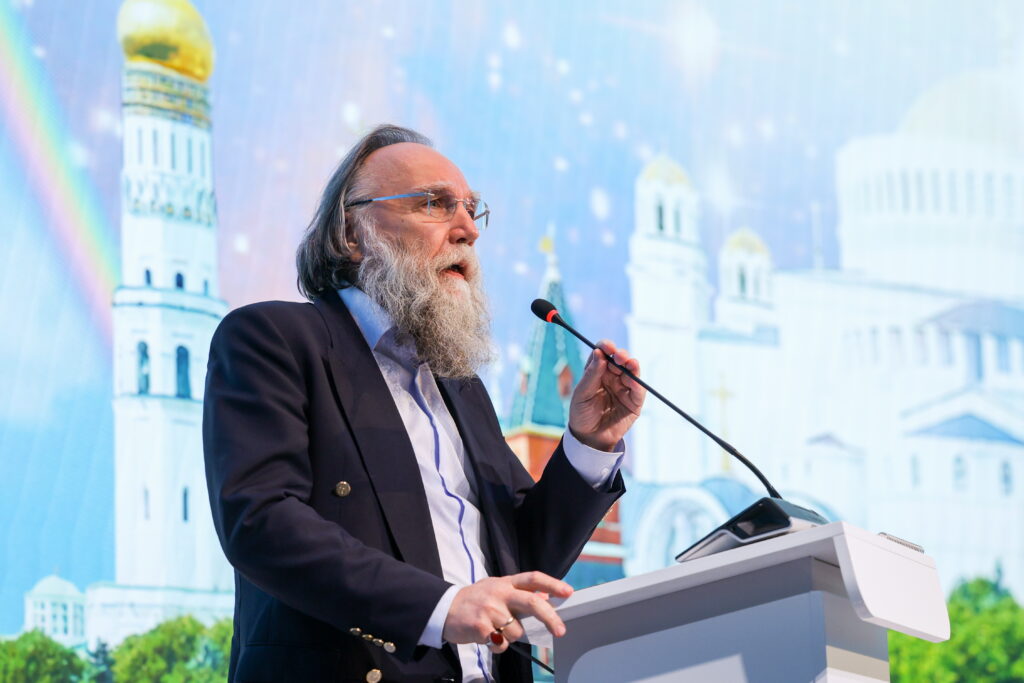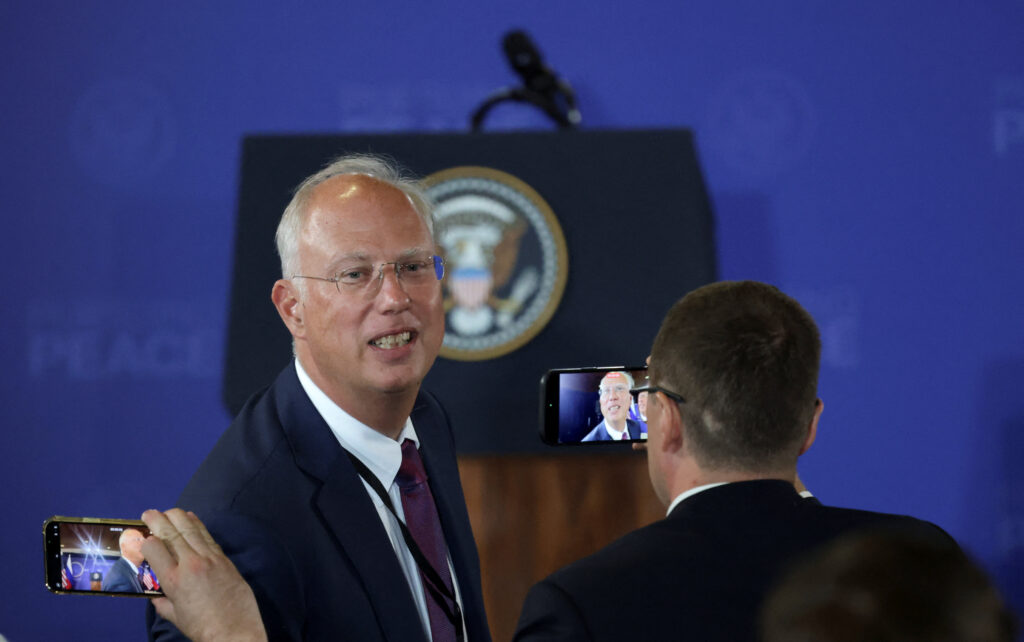It may seem strange today to remember that just six years ago, leading television channels from Russia occupied an important place in Ukraine’s media landscape, while leading Russian newspapers published editions in Ukraine. However, after the turbulent events of 2014, the influence of media outlets tied to Russia, or at least those following the script set in Moscow, began to wane. But even during the upheavals during the annexation of Crimea and the most heated phase of the war in the Donbas, many Ukrainians persisted in watching television channels from Moscow or keeping informed by the Russian segment of the internet. It was only later when the Ukrainian side began to resort to restrictions.
To ban is easy
The first Russian media outlets to come under sanctions from the Ukrainian authorities, as far back as 2014, were Russia’s most popular federal television channels: Channel One, RTR-Planeta, Russia-24, and NTV-Mir. The ban on these channels was instituted after rulings by administrative and judicial bodies in Ukraine, which forbade providers from broadcasting these channels’ signals across the country’s terrestrial and cable networks. The list of undesirable Russian television channels in Ukraine has since expanded and continues to grow, today including more than seventy outlets. Of course, many of these channels are not even that well known to Russians themselves.
The formal reasons for these bans are violations of the rules of cross-border broadcasting and the airing of advertisements which are prohibited in Ukraine. Behind these justifications are concerns about overt anti-Ukrainian propaganda on Russian airwaves and the broadcast of films whose actors are included on the list of “people who pose a threat to national security.” At the start of 2017, even TV Rain (also known as Dozhd) ended up on this blacklist despite its reputation in Russia as pro-Ukrainian. The reason was that the channel had broadcast a map of Russia which included the Crimean peninsula and two films (What Men Still Talk About and Faster Than Rabbits) which “popularise the law enforcement agencies of the aggressor state,” among other offences.
That same year, then president of Ukraine Petro Poroshenko signed a decree which blocked access to the popular Russian social networks Odnoklassniki and VKontakte, as well as digital services offered by Yandex, Mail.Ru, and several other resources. The sites of Russian television channels, including the Ukrainian page of Russian state news agency RIA Novosti, later met the same fate. The last of the “blocking decrees” was issued in March 2019, which featured further additions to the list and extended the period of blocking the aforementioned social networks by another three years.
No restrictive measures were applied to the print press. It is true that some subsidiaries of Russian newspapers and magazines ceased to be published for financial reasons. However, newsstands in Kyiv still sell Ukrainian versions of the popular Russian tabloids Argumenty i Fakty, Ekspress-Gazeta, and Komsomolskaya Pravda (although the latter, whose name translates to “Komsomol Truth,” has been renamed in accordance with “requirements of Ukrainian legislation on decommunisation.) The editorial line of these newspapers is quite restrained; they attempt to avoid divisive topics on Russian-Ukrainian relations.
The power of distrust
Naturally, in today’s world no prohibition or block can ever be relied upon to completely cut off the flow of information. Russian television channels can still be accessed by satellite dishes, so still have audiences in Ukraine — albeit rapidly declining ones. According to sociological surveys, at the end of 2015 nearly 20% of Ukrainians still watched Russian television; by the spring of 2019 the number of viewers had fallen to 4.3%. Furthermore, only one of three viewers trusted what they watched, meaning a mere 1.4% of all respondents.
Russian news websites attract comparatively greater interest. According to one of several recent surveys conducted by InMind, a sociological research company commissioned by InterNews, 13% of respondents said that they read or watch Russian media. Meanwhile, every third person has an acquaintance who accesses Russian media as a source of news. Among those who do read or view Russian websites and television channels, 35% said that they did so in order to familiarise themselves with an alternative point of view, 22% said that they were simply interested in the content, and 21% said that they liked accessing information in Russian. But when it comes to trust, the picture is more dispiriting: only 20% of the audience trusted news sites at all and 24% trusted television channels. Thus according to this survey, a maximum of 2.5-3% of all respondents trusted Russian media sources.
Nevertheless, those who do want to access the blocked sites can easily do so by using a VPN or proxy server. However, the motivation to use Russian social networks or search engines is also waning. In April 2017, on the eve of the presidential decree which banned these sites, 78% of all internet users in Ukraine (approximately 20 million people) had an account on VKontakte, while 48% used Yandex on a daily basis. By the autumn of that year, according to experts, the number of users who persisted in using blocked internet resources decreased by a third. By the end of 2018, just 20-30% of Ukrainian internet users visited Russian social networks. Digital experts now maintain that VKontakte holds 20% of the Ukrainian social media market, followed by Odnoklassniki with 13%. While Facebook lagged behind them before the ban, it has since increased its share to 43%.
However, as recently as a year ago, VKontakte remained Ukraine’s fourth most visited online domain. Yandex and Odnoklassniki also remain among the country’s top ten most visited websites.
The pro-Russian world(view)
Despite this precipitous drop in the audience for Russian media in Ukraine, not to mention Ukrainians’ trust in these outlets, Moscow’s position is still well-represented in the country thanks to local so-called pro-Russian media outlets. More often than not, these either have close ties to odious politicians or (presumably) receive funding from the Russian Federation.
Many politicians in Kyiv consider one group of outlets to be a particular threat to national security. These are television channels which specialise in news broadcasting, such as NewsOne, 112 Ukraine, and ZIK. Between October 2018 and June 2019, all these channels were acquired by the businessman and deputy of the Verkhovna Rada, the Ukrainian parliament, Taras Kozak. They were subsequently merged into the Novosti holding. Kozak has declared that from now on he will be able to “build the largest network of informational broadcasters, which in terms of resources will be less expensive [to run] and helps generate capital as an asset.” The head of the Novosti holding was the Russian media producer Alexey Semyonov, who had recently received Ukrainian citizenship.
The actual owner of these television channels is widely considered to be Viktor Medvedchuk, head of the political council of the Opposition Bloc – For Life party, a pro-Russian coalition. Medvedchuk also happens to have a close personal connection to Vladimir Putin (the Russian president is the godfather to Medvedchuk’s daughter Daria.) According to journalists, Taras Kozak is also a member of Medvedchuk’s inner circle.
Nevertheless, formally the leader of the Opposition Bloc – For Life has no formal connection to these television channels. “In fact, these channels were purchased by a frontman, meaning that we cannot prove that they have any connection to Medvedchuk,” declared Ulyana Feshchuk, deputy head of the National Council on Television and Radio Broadcasting, at a session of the Verkhovna Rada in July 2019. Last summer, reports also surfaced that Medvedchuk’s corporate structures had purchased a controlling stake in InterTV’s channel from the oligarch Dmitry Firtash, though this information has yet to be conclusively confirmed.
On September 26, Ukraine’s National Council on Television and Radio Broadcasting refused to renew the broadcasting licence of five television companies which relayed the 112 Ukraine channel to digital networks. The council justified its decision with the fact that the companies in question had been systematically violating the terms of the licences and the requirements of the law. Nevertheless, the operation of the channel itself is not prohibited, and it remains available on cable networks, the internet, or by satellite dish. However, the newsroom at 112 Ukraine decried “harsh censorship” and expressed “doubts about freedom of speech in Ukraine.” Ultimately the public outcry over this restriction to the channel’s broadcasting was fairly insignificant.
The Vesti newspaper, which has been published since 2013 and was officially launched with financial support from Russian investors, was also considered to be connected to Medvedchuk. Today it is part of the Multimedia Invest Group holding (alongside the UBR television channel, Vesti.Reporter magazine, and Radio Vesti), which is owned by Oleksandr Klimenko, who served as Minister of Revenue and Duties under the rule of former president Viktor Yanukovych. Today, Klimenko resides in Moscow. Until 2018, the Vesti newspaper was distributed in Ukraine’s major cities free of charge, though later began to be sold for a nominal fee. The content of the newspaper, much like that of other members of the media holding, does give good grounds to talk about the promotion of pro-Russian, propagandistic talking points. In May 2014, the editorial offices of Vesti were searched by Ukrainian law enforcement: its chief editor Igor Guzhva and its publisher were charged with money laundering and tax evasion.
Following the sale of the newspaper to Klimenko’s corporate structures in the summer of 2015, Igor Guzhva left the post of editor in chief and founded the online publication Strana.Ua. Like the newspaper Vesti, Strana.Ua is published solely in Russian, is highly critical of Ukraine’s aspirations for European integration (under both the previous and current governments) and advocates improving relations with the Russian Federation. Igor Guzhva and his deputy Svetlana Kryukova have hosted a programme on the NewsOne channel and appeared on 112 Ukraine. In summer 2017, Guzhva was detained on charges of attempting to extort the parliamentary deputy Dmitry Linko, whom he had allegedly attempted to blackmail under threat of publishing compromising material. After he was released on bail, the head of Strana.Ua managed to relocate to Austria, where he received political asylum. His website continues to operate: despite its tendentious content, Strana.Ua presents its materials very professionally so stands out in the Ukrainian media landscape. One survey from this spring showed that Strana.Ua ranked 12th by monthly audience reach out of all news websites which produce their own original content (giving Strana.Ua approximately nine percent of the audience.) The websites 112.Ua and Zik.Ua, which belong to the television channels of the same name, also made it into the top twenty news websites. Newsone.Ua came 22nd.
There are several more pro-Russian news websites in Ukraine, but they are rarely cited and have a far weaker influence; they are no match for those described above. In any case, the ecosystem of pro-Russian media operating in the country today still manages to have a significant impact on the outlook of many Ukrainians.
In conclusion, upon designating Russia as an aggressor state, the Ukrainian authorities took it upon themselves to take certain measures to limit the reach of Russian media outlets. Ukrainian society largely followed suit, developing a strong distrust towards such media outlets. But when it came to their own, Ukrainian, media resources — even those which are guided by pro-Kremlin positions — such measures have proven woefully ineffective. One reason for this is the lack of a long tradition of suppressing the media in Ukraine, and Ukrainian society and state’s strong rejection of any attempts to do so.
Here lies the fundamental irony of the situation. One can argue whether Ukraine’s media pluralism may be proudly boasted about as an example of freedom of speech in action. But on the other hand, that same pluralism may have been instrumental in giving Moscow a chance to establish a foothold in Ukraine’s media ecosystem.










